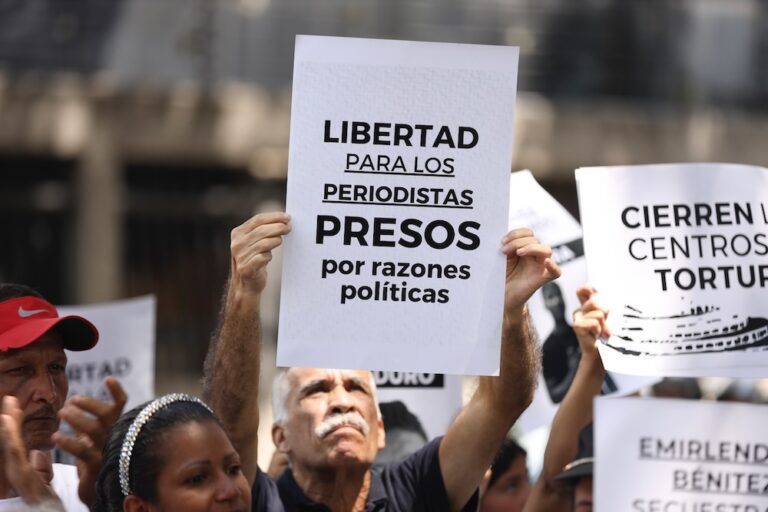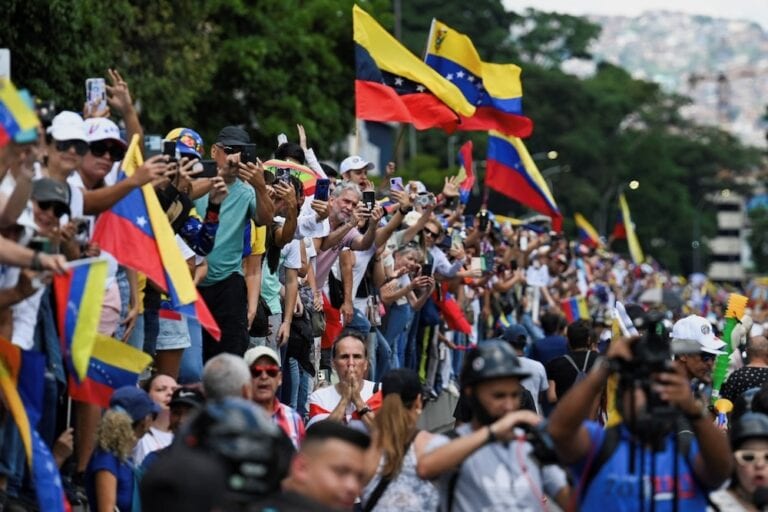According to a number of sources, Alexis Marrero, the author of the blog "Alexis Marrero in Politics", was informed that an arrest warrant had been issued against him.
A Dark Month for Media Freedom
(ARTICLE 19/IFEX) – 7 August 2009 – The past week has witnessed criminal charges against opposition blogger, Alexis Marrero, attacks against Globovision, the cancellation of broadcasting licenses of at least 34 radio stations and the submission of a bill on media crimes. All of these testify to the continuing and escalating war against the media and free speech, pluralism and diversity of opinions, in Venezuela.
On August 3rd unknown armed persons, allegedly lead by Lina Ron, a social leader and supporter of President Chavez, entered the headquarters of Globovision Television and threw tear gas inside the building. This is the latest in a long line of reported aggressions and attacks against the station and its employees in recent years. Currently this media outlet is facing five administrative procedures that could cancel definitively their broadcasting. Lina Ron was arrested and brought before a judge.
There have been reports of a number of other cases of harassment of journalists. According to a number of sources, Alexis Marrero, author of the blog “Alexis Marrero in Politics”, was informed that an arrest warrant had been issued against him on July 30th. He was summoned early this year to the special prosecutor’s office and was informed that an investigation was being launched against him for allegedly inciting or instigating to assassinate an important political figure, war propaganda, and contempt against the figure of the President. The accusations are based on a post on his blog entitled “Stop the misery Death to the Traitor, Death to Hugo Chavez” ( http://alexismarrero.blogspot.com/2008/07/basta-de-miseria-muerte-al-traidor.html ) in which he used hyperboles to express his political opinion.
On July 31st CONATEL, the National Telecommunications Commission, announced that it was withdrawing the licenses of 34 radio stations in some 15 states throughout the country, 13 of which stopped broadcasting shortly thereafter. CONATEL justified these actions on technical and administrative grounds for allegedly failing to hand in their registration papers. However, according to information issued by the Inter-American Commission on Human Rights the stations in question were also accused of “playing at destabilizing Venezuela”.
Last week, the Attorney General of Venezuela presented a new bill before Congress punishing “media related crimes” with up to four years in prison, for dissemination of information that is classified as false, or contrary to the State’s interests. Likewise it imposes sentences of up to 4 years for those people refusing to report “facts or situations in which the lack of disclosure constitutes an infringement of the right to information.” Some of the most problematic aspects of the draft bill include:
– The draft law is a special law on media crimes and should not be mistaken as a Media Law. Such types of specifically designed criminal legislation, especially with the extensive use of vague terminology, open the space for abuses and unjustified limitations on freedom of expression and freedom of the press.
– The restrictions it institutes are way beyond permissible restrictions as set in the international standards and some are not recognized by international law.
– The draft law includes terms which are vague, overbroad, and open to many different interpretations. For instance, “opportune information”, “sense of insecurity and impunity” and “media pressure” are considered as crimes under the draft bill, in violation of international standards on freedom of expression, particularly under article 19 of the ICCPR.
ARTICLE 19 calls upon the Venezuelan Government to turn its back on the actions of this past week and adopt immediate and positive measures to promote, protect and defend the right of freedom of expression, including:
– To immediately withdraw the draft bill on media crimes: there is little that can be salvaged from this draft bill. The best possible response to it should be its withdrawal. It is a stain on Venezuela’s legal records.
– To stop all actions of intimidation and harassment against voices of dissent, particularly in the cases of Alexis Marrero, workers of Globovision and media outlets with a critical political opinion.
– To investigate and bring to justice all perpetrators of attacks against media outlets, including those involved in the latest attack against Globovision.
– To reconsider CONATEL’s decision not to renew licenses: if administrative issues are at stake, CONATEL should extend the deadline to allow all concerned broadcasting outlets to comply with procedures. Further, the massive number of withdrawals indicates that the procedures are simply not working and should be reviewed. Finally, all concerned outlets should have the right to appeal the decision not to renew their licenses. The existence of varied, rich and diverse broadcasting media in Venezuela is essential to the country and should be a source of pride. All should be done to ensure that this media landscape is preserved and protected.


